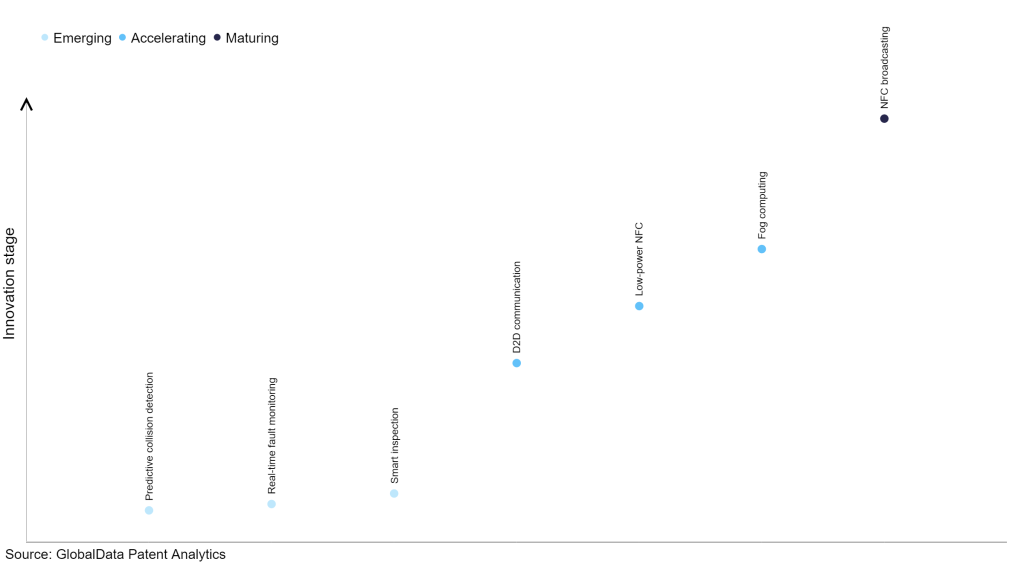The technology industry continues to be a hotbed of patent innovation. Activity is driven by the increasing demand for predictive maintenance solutions across various industries, as well as advancements in sensor technology and data analytics algorithms, and growing importance of technologies such as Internet of Things (IoT)-enabled sensors for data acquisition, edge computing for real-time analysis, and cloud-based platforms for centralized monitoring and reporting, collectively driving advancements in real-time fault monitoring within the IoT landscape. In the last three years alone, there have been over 1.5 million patents filed and granted in the technology industry, according to GlobalData’s report on Internet of Things in technology: real-time fault monitoring. Buy the report here.
However, not all innovations are equal and nor do they follow a constant upward trend. Instead, their evolution takes the form of an S-shaped curve that reflects their typical lifecycle from early emergence to accelerating adoption, before finally stabilizing and reaching maturity.
Identifying where a particular innovation is on this journey, especially those that are in the emerging and accelerating stages, is essential for understanding their current level of adoption and the likely future trajectory and impact they will have.
185+ innovations will shape the technology industry
According to GlobalData’s Technology Foresights, which plots the S-curve for the technology industry using innovation intensity models built on over 1.6 million patents, there are 1985+ innovation areas that will shape the future of the industry.
Within the emerging innovation stage, predictive collision detection, real-time fault monitoring and smart inspection are disruptive technologies that are in the early stages of application and should be tracked closely. D2D communication, low-power NFC and fog computing are some of the accelerating innovation areas, where adoption has been steadily increasing. Among maturing innovation areas is NFC broadcasting, which is now well established in the industry.
Innovation S-curve for Internet of Things in the technology industry

Real-time fault monitoring is a key innovation area in Internet of Things
Real-time fault monitoring is the ongoing process of instantly identifying and flagging anomalies or malfunctions within a system or device. It employs a combination of sensors, data analysis methods, and control systems to promptly pinpoint potential issues or deviations from standard operation. By adopting real-time fault monitoring, businesses can take proactive measures to resolve faults, thereby reducing downtime, boosting productivity, and fortifying the overall dependability of their systems.
GlobalData’s analysis also uncovers the companies at the forefront of each innovation area and assesses the potential reach and impact of their patenting activity across different applications and geographies. According to GlobalData, there are 530+ companies, spanning technology vendors, established technology companies, and up-and-coming start-ups engaged in the development and application of real-time fault monitoring.
Key players in real-time fault monitoring – a disruptive innovation in the technology industry
‘Application diversity’ measures the number of applications identified for each patent. It broadly splits companies into either ‘niche’ or ‘diversified’ innovators.
‘Geographic reach’ refers to the number of countries each patent is registered in. It reflects the breadth of geographic application intended, ranging from ‘global’ to ‘local’.
Patent volumes related to real-time fault monitoring
| Company | Total patents (2010 - 2022) | Premium intelligence on the world's largest companies |
| Gree Electric Appliances | 32 | Unlock Company Profile |
| ZTE | 11 | Unlock Company Profile |
| Toyota Motor | 29 | Unlock Company Profile |
| Yokogawa Electric | 14 | Unlock Company Profile |
| Fanuc | 24 | Unlock Company Profile |
| Siemens | 10 | Unlock Company Profile |
| Dongfeng Motor | 29 | Unlock Company Profile |
| NXP Semiconductors | 13 | Unlock Company Profile |
| Zhejiang Geely Holding Group | 11 | Unlock Company Profile |
| Launch Tech | 50 | Unlock Company Profile |
| Hyundai Motor | 39 | Unlock Company Profile |
| State Grid Corporation of China | 72 | Unlock Company Profile |
| Lear | 10 | Unlock Company Profile |
| Hitachi | 21 | Unlock Company Profile |
| Jiangling Motors | 9 | Unlock Company Profile |
| Advantest | 9 | Unlock Company Profile |
| Anhui Jianghuai Automobile Group | 20 | Unlock Company Profile |
| General Electric | 25 | Unlock Company Profile |
| China Southern Power Grid | 25 | Unlock Company Profile |
| Mitsubishi Electric | 10 | Unlock Company Profile |
| Boeing | 31 | Unlock Company Profile |
| China General Nuclear Power | 31 | Unlock Company Profile |
| Denso | 14 | Unlock Company Profile |
| Tokyo Electron | 11 | Unlock Company Profile |
| Kia | 39 | Unlock Company Profile |
| China FAW Group | 37 | Unlock Company Profile |
| TTTech Auto | 11 | Unlock Company Profile |
| Autel Intelligent Technology | 25 | Unlock Company Profile |
| Traffic Control Technology | 11 | Unlock Company Profile |
| Xuji Electric | 12 | Unlock Company Profile |
Source: GlobalData Patent Analytics
Among the companies innovating in real-time fault monitoring, State Grid Corporation of China is one of the leading patents filers. The company’s patent is focused on a specific test system along with a power utilization information acquisition system. The testing method involves sending a remote-control test command to an electric energy meter during a power utilization valley period via a remote acquisition terminal and a first communication network. It then checks whether the execution result information from the electric energy meter, returned by the remote acquisition terminal, is received within a set timeframe via a second communication network. If the information is received within the designated time, it confirms the normal functioning of the power utilization information acquisition system's control over the electric energy meter through the remote acquisition terminal. The method offers an accurate means to test the system's remote-control capabilities without introducing additional equipment or disrupting the user's power utilization. Other prominent patent filers in the space include Alphabet and Launch Tech Company.
In terms of application diversity, Alphabet held the top position, while Kia and Hyundai Motor stood in the second and third positions, respectively. By means of geographical reach, Alphabet leads the pack, followed by Emerson Electric and Tokyo Electron.
Real-time fault monitoring in IoT is critically important for maintaining the reliability and performance of interconnected systems. By instantly identifying and addressing anomalies, organizations can prevent potential disruptions, reduce downtime, and ensure the seamless operation of IoT-enabled devices and processes.
To further understand the key themes and technologies disrupting the technology industry, access GlobalData’s latest thematic research report on Internet of Things.
Data Insights
From

The gold standard of business intelligence.
Blending expert knowledge with cutting-edge technology, GlobalData’s unrivalled proprietary data will enable you to decode what’s happening in your market. You can make better informed decisions and gain a future-proof advantage over your competitors.







